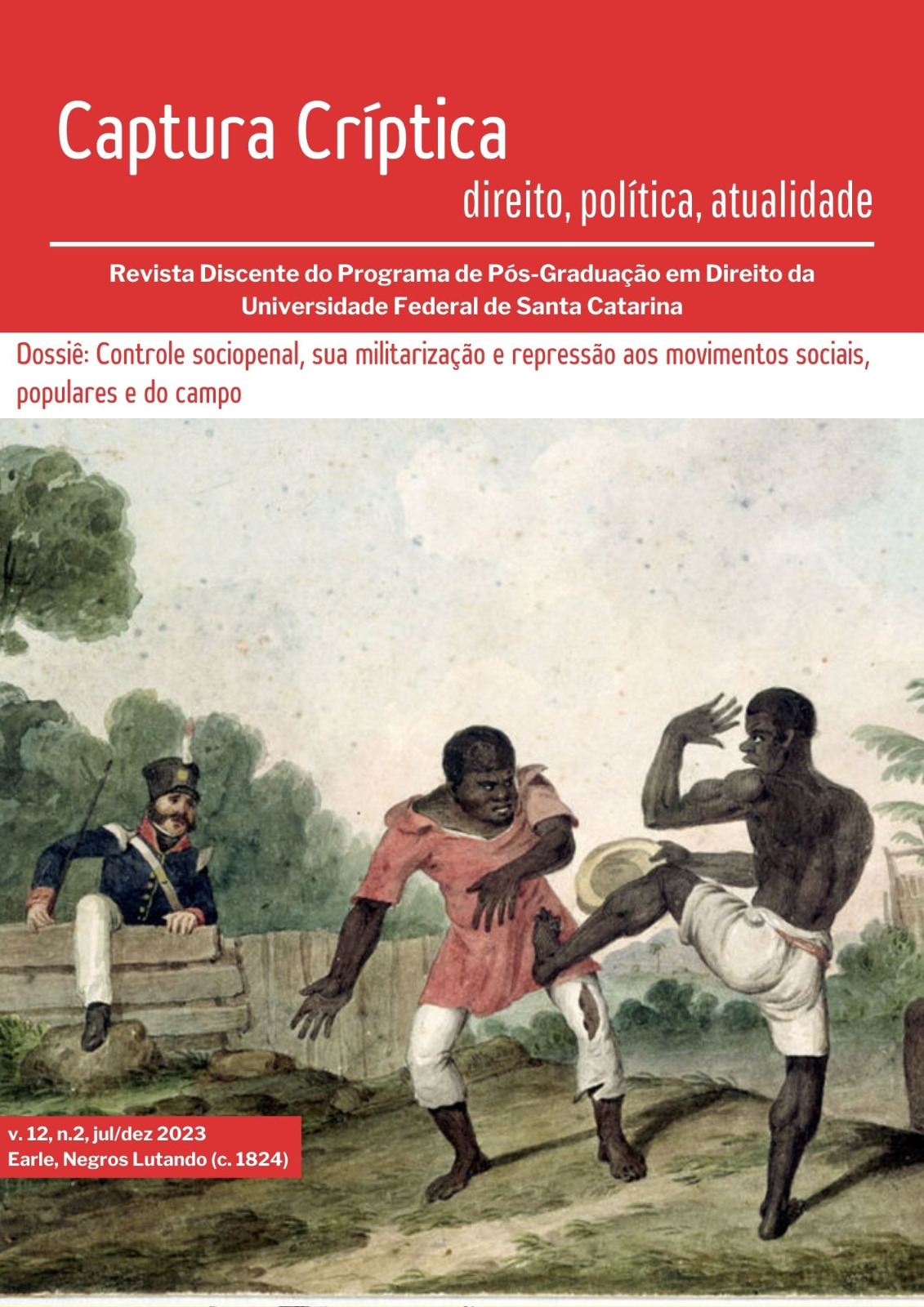Old forgotten links: policing as a factor in increased incarceration
Keywords:
Policing, Incarceration, Punitiveness, Interactions, CriminologyAbstract
The phenomenon of hyper-incarceration is a source of attention for researchers in the region, and studies seeking to understand it are increasing, but we still have many questions that we cannot answer. One of them, and the one I want to work on in this brief article, is: How does policing impact on the decrease or increase of the incarceration rate? Although few attempts have been made to establish a link between the police and their daily work and incarceration, there is research that has tried to do so, so in the following I intend to present some approaches and statements that are important to begin to pay attention to this line of work.
References
BECKETT, Katherine. Making Crime Pay: Law and Order in Contemporary American Politics. New York: Oxford University Press, 1997.
BRAGA, Anthony. Better Policing Can Improve Legitimacy and Reduce Mass Incarceration. Harvard Law Review, v. 129, n. 7, p. 233-241, 2016.
BREGMAN, Marcelo; FLOM, Hernán. Determinantes de la confianza en la policía: una comparación entre Argentina y México. Perfiles Latinoamericanos, n. 40, p. 97-122, 2012.
BRODEUR, Jean-Paul. Comparative penology in perspective. En: TONRY, Michael (ed.). Crime, punishment and politics in comparative perspective [Crime and Justice, 36]. Chicago: The University of Chicago Press, 2007. p. 49-91.
CALZADO, Mercedes; FERNÁNDEZ, Mariana; LIO, Vanesa. Seguridad, miedo y campañas políticas en la Ciudad de Buenos Aires. En: VII Seminario Internacional Políticas de la Memoria, 2014.
CAVADINO, Michael; DIGNAN, James. Penal Systems: A Compatarive Approach. London: Sage, 2006.
CHRISTIE, Nils. Los límites del dolor. México: FCE, 1988.
FEELEY, Malcolm; SIMON, Jonathan. Actuarial Justice: The Emerging New Criminal Law. En: NELKEN, David (ed.). The Futures of Criminology. London: Sage, 1994.
FEELEY, Malcolm; SIMON, Jonathan. La nueva penología: notas acerca de las estrategias emergentes en el sistema penal y sus implicaciones. Delito y Sociedad, n. 6–7, p. 33-58, 1995.
GARLAND, David. The Limits of the Sovereign State: Strategies of Crime Control in Contemporary Society. British Journal of Criminology, v. 36, n. 4, p. 445-471, 1996.
GARLAND, David. La cultura del control. Crimen y orden social en la sociedad contemporánea. Barcelona: Gedisa, 2005.
GARLAND, David. Punishment and Welfare: Social Problems and Social Structures. En: LIEBLING, Alison; MARUNA, Shadd; McAra, Lesley (eds.). The Oxford Handbook of Criminology. Oxford: Oxford University Press, 2017. p. 77-97.
GORDON, Diana. The topography of criminal justice: a factor analysis of the ‘get-tough’ policy trend. Criminal Justice Policy Review, v. 3, n. 2, p. 184-207, 1989.
GOTTSCHALK, Marie. Caught: The Prison State and the Lockdown of America. Princeton: Princeton University Press, 2015.
HAMILTON, Claire. Reconceptualizing Penality: Towards a Multidemensional Measure of Punitiveness. The British Journal of Criminology, v. 54, n. 2, p. 321-343, 2014.
HINDS, Lyn. Crime Control in Western Countries, 1970 to 2000. En: PRATT, John; BROWN, David; BROWN, Mark; HALLSWORTH, Simon; MORRISON, Wayne (eds.). The New Punitiveness: Trends, theories, perspectives. Devon: Willan Publishing, p. 47-65, 2005.
JACQUES, Scott; WRIGHT, Richard. Code of the Suburb: Inside the World of Young Middle-Class Drug Dealers. Chicago: The University of Chicago Press, 2015.
KESSLER, Gabriel. El sentimiento de inseguridad: sociología del temor al delito. Buenos Aires: Siglo XXI, 2011.
LACEY, Nicola. The Prisoners’ Dilemma: Political Economy and Punishment in Contemporary Democracies. Cambridge: Cambridge University Press, 2008.
LAPPI-SEPPÄLÄ, Tapio. Trust, Welfare, and Political Culture: Explaining Differences in National Penal Policies. Crime and Justice, v. 37, n. 1, p. 313-387, 2008.
LAPPI-SEPPÄLÄ, Tapio. American Exceptionalism in Comparative Perspective: Explaining Trends and Variation in the Use of Incarceration. En: REITZ, Kevin R. (ed.): American Exceptionalism in Crime and Punishment. Oxford: Oxford University Press, 2018. p. 195-271.
NEAPOLITAN, Jerome. An Examination of Cross-National Variation in Punitiveness. International Journal of Offender Therapy and Comparative Criminology, v. 45 n. 6, p. 691-710, 2001.
NEUSTETER, Rebecca; SUBRAMANIAN, Ram; TRONE, Jennifer; KHOGALI, Mawia; REED, Cindy. Gatekeepers: The Role of Police in Ending Mass Incarceration. Safety+Justice Challenge, Vera Institute of Justice, 2019.
PHELPS, Michelle; PAGER, Devah. Inequality and Punishment: A Turning Point for Mass Incarceration?. The ANNALS of the American Academy of Political and Social Science, v. 663, n. 1, p. 185-203, 2016.
ROLDÁN, Nahuel. Policiamiento urbano, género y raza: interacciones entre jóvenes y policías”. En: ALZUETA, Esteban Rodríguez (comp.): Yuta. El verdugueo policial desde la perspectiva juvenil. La Plara: Malisia, 2020. p. 69-116.
SIMON, Jonathan. Gobernar a través del delito. Barcelona: Gedisa, 2007.
SKOLNICK, Jerome. Justice Without Trial. En: WEISBURD, David; UCHIDA, Craig (eds.). Police Innovation and Control of the Police: Problems of Law, Order, and Community. New York: Springer-Verlag, 1993. p. 13-31.
SOZZO, Máximo. Postneoliberalismo y penalidad en América del Sur. A modo de introducción. En: SOZZO, Máximo (comp.). Postneoliberalismo y penalidad en América del Sur. CABA: CLACSO, 2016, 9-28.
SOZZO, Máximo. La inflación punitiva. Un análisis comparativo de las mutaciones del derecho penal en América Latina (1990-2015). CABA: Café de las Ciudades, 2017.
TONRY, Michael. Determinants of penal policies. En: TONRY, Michael (ed.). Crime, punishment and politics in comparative perspective [Crime and Justice, 36]. Chicago, The University of Chicago Press, 2007. p. 1-48.
WENZELBURGER, Georg. Political Economy or Political Systems? How Welfare Capitalism and Political Systems Affect Law and Order Policies in Twenty Western Industrialised Nations. Social Policy & Society, v. 17, n. 2, p. 209-226, 2018.
YOUNG, Kathryne; PETERSILIA, Joan. Keeping Track: Surveillance, Control, and the Expansion of Carceral State. Harvard Law Review, v. 129, n. 7, p. 1318-1360, 2016.
Downloads
Published
Issue
Section
License
Copyright (c) 2023 Nahuel Roldán

This work is licensed under a Creative Commons Attribution-NonCommercial-NoDerivatives 4.0 International License.
Submissions published in the Captura Críptica Journal are under the Creative Commons Attribution-noncommercial-NoDerivatives 4.0 International License.










